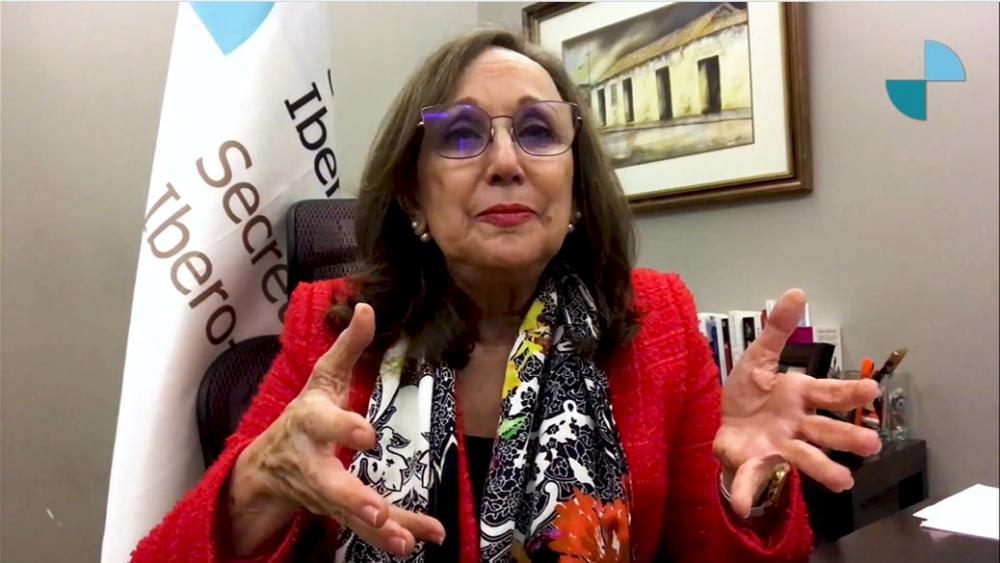Rebeca Grynspan, Ibero-American Secretary General, and Cassio Luiselli, member of the Advisory Council for Food Security in the Americas, shared their impressions during the Fortieth Regular Meeting of the Executive Committee of IICA.

San Jose, 23 July 2020 (IICA). The status of food security in the Americas and the challenges for the new technical cooperation model amidst the emergency situation generated by Covid-19, particularly in terms of providing the population with safe, nutritious food, were the main topics discussed during the Inter-American Meeting on Agriculture and Food Security, held within the framework of the Fortieth Regular Meeting of the Executive Committee of the Inter-American Institute for Cooperation on Agriculture (IICA).
Rebeca Grynspan, Ibero-American Secretary General (SEGIB), and Cassio Luiselli, member of the Advisory Council for Food Security in the Americas, discussed these scenarios and proposed adequate responses for strengthening cooperation between countries and mitigating the effects of the pandemic.
They noted that, in order to drive economic reactivation and food security in the Latin American and Caribbean region, it will be necessary to capitalize on the potential of multilateralism, maintain the flow of goods, minimize trade barriers, foster production chains with greater value added, improve food marketing and distribution, and strengthen family farming.
“High-level international political bodies have not undertaken the forceful actions we were expecting during the current pandemic”, argued Grynspan, who discussed the impact of this new international scenario on cooperation and the role played by regional agencies.
“The responses to Covid-19, especially at the onset of the pandemic, have been of a national nature, despite the fact that the pandemic is a global problem. We have provided fragmented, local responses, which shows that the multilateral system has grown weaker—a process that all countries must avoid, as they raise their voices in favor of multilateralism”, she remarked.
Grynspan explained that the developmental issues resulting from the health crisis should be addressed from all angles, by fostering regional cooperation and networking, joining capacities and knowledge, bringing youth to the forefront, as well as driving progress in rural and urban areas and connecting them to advance towards sustainability.
“We require a horizontal type of cooperation, under which we must acknowledge the fact that no one has all the answers, and that dialogue, exchanges, respect for others’ experiences, and collective efforts are what will enable us to find the answers. We don’t have the necessary time or resources to solve problems on our own”, she stated.
“We have the possibility to use our skills to transform the rural world, to humanize the continuum between cities and the countryside, to provide a more environmentally friendly economy, a blue economy. And we can seek to create a digital society that bridges gaps instead of widening them. We can strive for equal opportunities and a fairer world, at a time when inequalities are growing”, she added.
The regional paradox: production potential amidst poverty
On the other hand, Casio Luiselli described the food security scenario in Latin America and the Caribbean (LAC) – a region, which, in his mind, has the most agricultural and production potential in the world, but which faces daunting challenges, given the inequalities, great contrasts and poverty resulting from unequal income distribution in most countries – a situation that the pandemic has aggravated.
The Professor and former Advisor to the President of Mexico on agricultural development remarked that, “It is a paradoxical situation, given that this is a region with enormous potential. Yet, the problems stemming from inequality are continuing to hold us back and to create food security problems”.
Luiselli spoke of the existence of four Latin Americas. First of all, there is the Southern region, which is the most developed and which Luiselli describes as the greatest potential food reserve in the world. By contrast, the Andean region, despite having extremely productive areas, also includes other places that are suffering from increasing food insecurity and poverty, most notably the indigenous and rural communities.
He referred to similar shortcomings in Central America, mainly in the Central American Dry Corridor, while emphasizing the Caribbean’s dependence on imports to satisfy its needs, given its limited availability of agricultural land.
The expert explained that due to Covid-19, the main problem that the agrifood industry faces was that the demand had been affected by aspects such as the fall-out in the labor market.
“Let us not forget that Latin America is 80% urban”, he said, “and cities are facing a dire situation. The pandemic has displaced more or less 50% of the many people who were working in the informal sector. Poverty is climbing and as many as 150 or 180 million more people may fall below this line”.
Luiselli reflected that in order to mitigate the effects of the crisis, countries must first of all support family farming by supplying inputs, such as seeds, fertilizers and access to credit. They must also reconceptualize food systems; strengthen and increase the value-added component of production chains; reform institutional structures and guarantee international trade.
In closing, he remarked that, “The main tasks are to restore demand, support the supply chain and protect free trade. International trade must remain open without putting a stranglehold on supply chains, without using administrative barriers as a pretext and converting them into non-tariff barriers. We should not obstruct or interrupt trade matters in this way, and at the same time we should work towards greater integration in LAC”.
More information:
Institutional Communication Division, IICA.
comunicacion.institucional@iica.int











